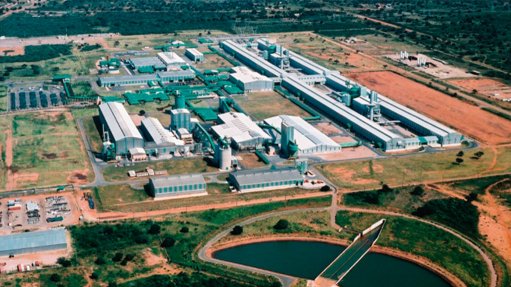DWS hosts public consultation on revamped water, sanitation regulations
As the end of the public comment period nears, the Department of Water and Sanitation (DWS) held public consultations for the proposals set out in the draft Compulsory National Standards for Water Supply and Sanitation Services and Regulation 3630.
The regulations, gazetted on January 12, aim to strengthen drinking water quality regulations, ensure the effective management of water losses, prescribe minimum standards for water supply and sanitation services at household levels, prescribe minimum qualifications for technical personnel at water services authorities, the management of negative impacts of electricity loadshedding in the water sector and the management of water losses.
The draft regulations seek to promote water conversation and water demand management to curb water losses through adequate infrastructure maintenance, pressure management practices and the implementation of water and water balance analysis and determination of water losses.
The draft regulations outline basic water services, including a minimum quantity of potable water of 25 litres a person a day, or a minimum of 6 kl a household a month, with availability of at least 350 days a year and no interruptions longer than 48 consecutive hours.
According to the draft, a water services institution must take responsible measures to ensure that where water supply is interrupted for a period of more than 48 hours, including where an emergency situation is declared, a consumer has access to alternative water supply comprising of at least 10 litres of potable water a person a day that is made available at strategically determined points of delivery that are convenient and safe.
Whenever alternative drinking water sources are used for provision of drinking water for longer than a week, the water services institution must register a monitoring programme on the integrated regulatory information system.
In terms of the quality of drinking water, the draft indicates that water services institutions must ensure that the distributed drinking water is fit for human consumption in line with SANS 241, and they are required to develop and implement a water safety plan for all water supply systems in line with the World Health Organisation’s approach to water safety planning,
The institutions must also develop and implement a monitoring programme to monitor the quality of drinking water supplied, as well as develop and implement an incident management protocol for the management of noncompliances and categorisation of incidents.
According to the gazette, outlining standards for the efficient and sustainable use of water where spills or leaks in the water supply system and wastewater collection network are detected or reported, a water services institution must ensure they are contained and repaired within 48 hours, besides other standards.
The institutions also need to take steps to measure and progressively reduce losses and maintain the water use efficiency key performance indicators, including the quantity of water losses, the quantity of nonrevenue water, infrastructure leakage index and per capita use to within international accepted norms of between 10% and 20% for nonrevenue water and water losses, between 2 and 4 for the infrastructure leakage index and 150 l to 200 l per capita use.
The draft further outlines the management of the negative impact of disruptive electricity supply on water services, including the mitigation of loadshedding by making provision for the installation and operation of diesel generators, developing alternative sources of electricity, maximising water treatment while electricity is available and revising the minimum operational levels for reservoirs to increase storage capacity.
The draft Compulsory National Standards for Water Supply and Sanitation Services and Regulation also cover standards relating to interim and basic sanitation services and emergency sanitation services, as well as the quality of water discharged into water services or water resources system, including standards surrounding greywater, sewer collection, wastewater treatment and faecal sludge management; the quantity and quality of industrial wastewater collected into sewerage systems; the quantity and quality of wastewater discharged into water resources; and the control of objectionable substances.
Further, under the standards for the construction and functioning of water services works and consumer installations, the gazette outlines that water services institutions must maintain a water and wastewater balance analysis and determination of water losses.
It also covers standards relating to the nature, operation, sustainability, operational efficiency and economic viability of water services, including human resource planning; competency requirements; the management and operations of water treatment works and water supply networks; the maintenance and operation of wastewater treatment systems; the operation and maintenance budget and costing; and water and sanitation services infrastructure management.
Article Enquiry
Email Article
Save Article
Feedback
To advertise email advertising@creamermedia.co.za or click here
Press Office
Announcements
What's On
Subscribe to improve your user experience...
Option 1 (equivalent of R125 a month):
Receive a weekly copy of Creamer Media's Engineering News & Mining Weekly magazine
(print copy for those in South Africa and e-magazine for those outside of South Africa)
Receive daily email newsletters
Access to full search results
Access archive of magazine back copies
Access to Projects in Progress
Access to ONE Research Report of your choice in PDF format
Option 2 (equivalent of R375 a month):
All benefits from Option 1
PLUS
Access to Creamer Media's Research Channel Africa for ALL Research Reports, in PDF format, on various industrial and mining sectors
including Electricity; Water; Energy Transition; Hydrogen; Roads, Rail and Ports; Coal; Gold; Platinum; Battery Metals; etc.
Already a subscriber?
Forgotten your password?
Receive weekly copy of Creamer Media's Engineering News & Mining Weekly magazine (print copy for those in South Africa and e-magazine for those outside of South Africa)
➕
Recieve daily email newsletters
➕
Access to full search results
➕
Access archive of magazine back copies
➕
Access to Projects in Progress
➕
Access to ONE Research Report of your choice in PDF format
RESEARCH CHANNEL AFRICA
R4500 (equivalent of R375 a month)
SUBSCRIBEAll benefits from Option 1
➕
Access to Creamer Media's Research Channel Africa for ALL Research Reports on various industrial and mining sectors, in PDF format, including on:
Electricity
➕
Water
➕
Energy Transition
➕
Hydrogen
➕
Roads, Rail and Ports
➕
Coal
➕
Gold
➕
Platinum
➕
Battery Metals
➕
etc.
Receive all benefits from Option 1 or Option 2 delivered to numerous people at your company
➕
Multiple User names and Passwords for simultaneous log-ins
➕
Intranet integration access to all in your organisation


















